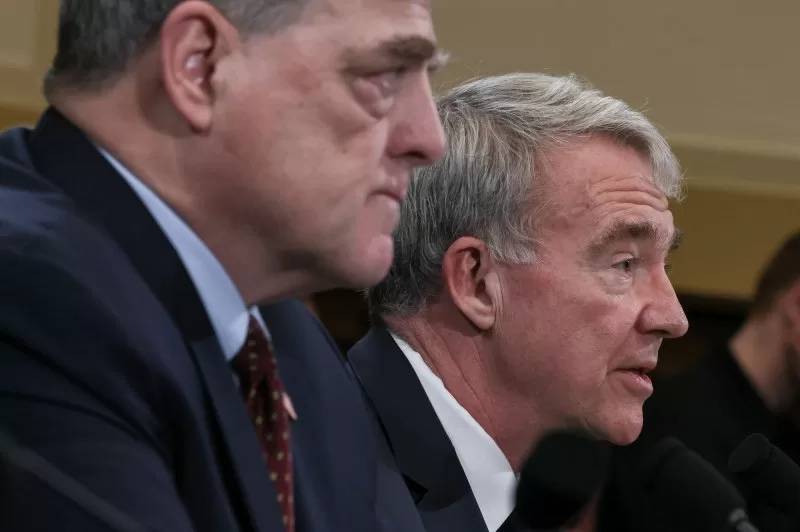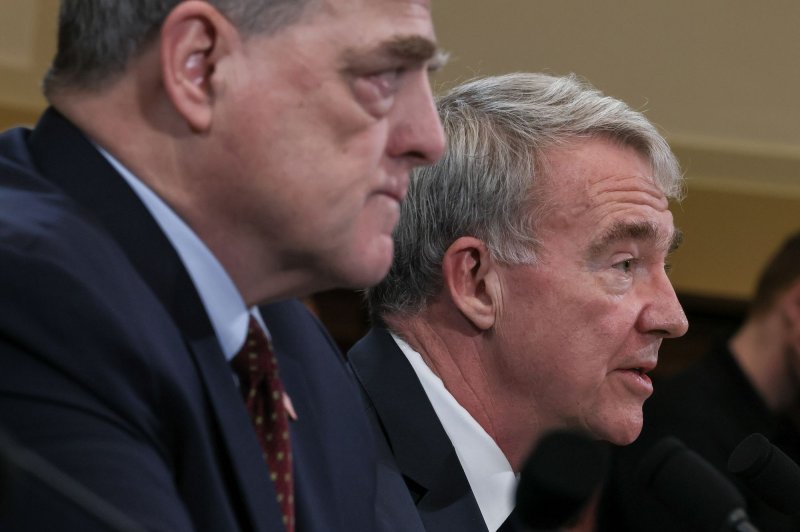1 of 8 | Retired Gen. Mark A. Milley (L) and Ret. Gen. Kenneth McKenzie testify during a Senate hearing in Washington, D.C. Both men spoke about events that unfolded before and after the United States pulled out Afghanistan in 2021. Photo by Jemal Countess/UPI |
License PhotoMarch 19 (UPI) — The two top former U.S. military officials who oversaw the 2021 American withdraw from Afghanistan on Tuesday testified at a congressional hearing on events that unfolded before and after the United States pulled out from the Middle Eastern country.
Ret. Gen. Mark Milley, former chairman of the Joint Chiefs of Staff, said Tuesday during his opening statement that the United States’ pull-out from Afghanistan was “a strategic failure” saying the decision not to remove troops from the region sooner “came too late.”
“At the end of 20 years, we the military helped build an army, a state, but we could not forge a nation,” Milley told members of Congress during his House Foreign Affairs Committee testimony along with Ret. Gen. Kenneth McKenzie, then-commander of the U.S. Central Command.
“The enemy occupied Kabul, the overthrow of the government occurred and the military we supported for two decades faded away,” added Milley on the August 2021 scramble to evacuate nearly 124,000 U.S. personnel from Kabul’s Hamid Karzai International Airport.
“It was my view at the time that it was only a matter of when not if the Afghan government would collapse and the Taliban would take control,” Milley said during his testimony.
McKenzie, who blamed policy decisions, agreed with Milley that the decision to leave Afghanistan had come too late, noting his belief that the events of mid-to-late April 2021 “were the direct result of delaying the initiation of the NEO for several months,” the former CENTOM commander said referencing a noncombatant evacuation operation.
“In fact, until we were in extremists, and the Taliban had overrun the country — as you are aware of, the decision to begin a NEO rests with the Department of State, not the Department of Defense,” he said speaking of a difference in strategy between the two departments about a withdrawl.
“Despite this, we had begun positioning forces in the region as early as [July 9], but we could do nothing,” he said.
In April last year, the White House released a 12 page joint report by the Pentagon and State Department on the U.S. withdraw from Afghanistan which was critical of the Trump administration but stood behind President Joe Biden‘s decision to end America’s longest military incursion.
In September, Milley told ABC News that he had “lots of regrets” on the chaotically-described 2021 withdraw that resulted in 13 dead Americans — several of whose families were in attendance during Tuesday’s hearing — and 170 Afghani civilians.
“It didn’t end the way I wanted it,” the former general said at the time. “That didn’t end the way any of us wanted it.”
But on Tuesday, Milley said, “In short, the United States military performed one of the most incredible evacuations, under pressure, in recorded history and in an extremely difficult, dynamic and dangerous environment.”

